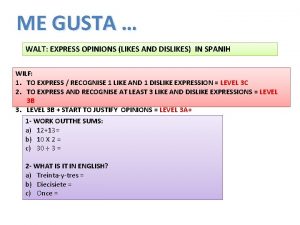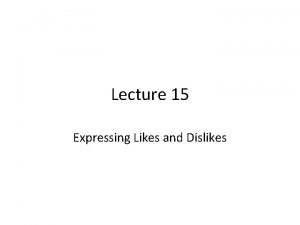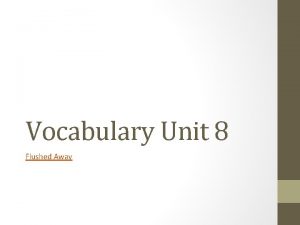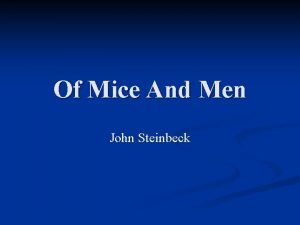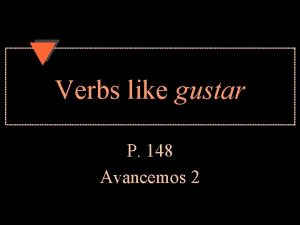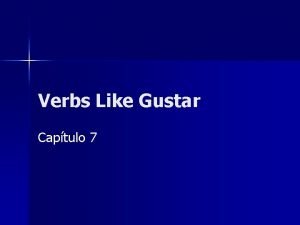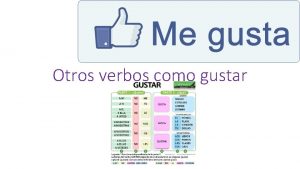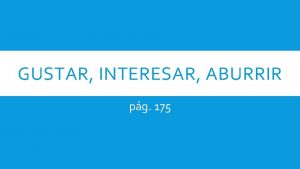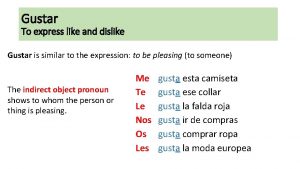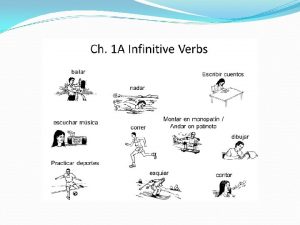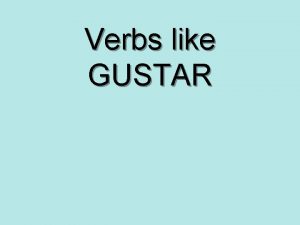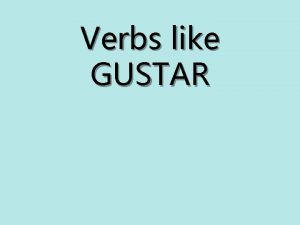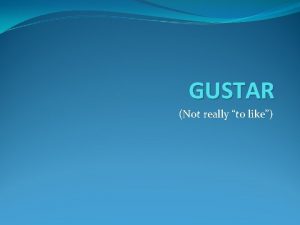Gustar To express like and dislike Gustar is













- Slides: 13

Gustar To express like and dislike Gustar is similar to the expression: to be pleasing (to someone) The indirect object pronoun shows to whom the person or thing is pleasing. Me Te Le Nos Os Les gusta esta camiseta gusta ese collar gusta la falda roja gusta ir de compras gusta comprar ropa gusta la moda europea

Gustar To express like and dislike Gustar is similar to the expression: to be pleasing (to someone) Me Te Le Nos Os Les gusta esta camiseta gusta ese collar gusta la falda roja gusta ir de compras gusta comprar ropa gusta la moda europea Me Te Le Nos Os Les gustan estas camisetas gustan esos collares gustan las faldas rojas gustan las modas europeas

¿Qué te gusta? Ask to your partner if he/she likes: ir al gimnasio llevar falda hacer los deberes de español jugar al baloncesto comer en un restaurante Modelo: - ¿Te gusta ir al gimnasio? - Si, me gusta ir al gimnasio. / No, no me gusta ir al gimnasio.

A + Noun To empathize to whom something is pleasing A mí no me gusta esta falda, pero a Luisa le encanta. A ti te gusta ir de compras, pero a Juan no le gusta. REMEMBER! A + mi A + ti A + el/ella/usted A + nosotros A + vosotros A + ellos/ellas/uds.

Verbs that follow the pattern of GUSTAR: Me fascina hablar español Te encanta cocinar Le parece muy fácil usar la computadora Nos interesa el cine Les queda muy poco dinero

Caer bien / Caer mal Esta dependienta no me cae bien I don’t like that salesclerk Les cae bien María They like Maria

¿Qué te interesa? Complete the sentences with the correct information, then compare them with your classmate. 1 - Me agrada… 2 - No me interesa… 3 - Me cae muy bien… 4 - Me encanta… 5 - No me parece… MODELO: a. b. c. d. e. … esta dependienta. … ir de compras. … muy barato este collar. … esta chaqueta. … comprar una talla más pequeña. 1 - b. Me agrada ir de compras

¿Qué te gusta hacer el fin de semana? 1. Think about what do you like to do during your weekend, and write down 3 sentences. 2. Then, with your classmate compare and discuss about your weekend. Modelo: Durante el fin de semana me gusta relajarme. Me agrada leer y mirar la tele. Además, me encanta salir con mis amigos de fiesta. No me parece bien ir a trabajar.

Ser y estar

Ser y estar SER is used to identify, describe and express nationality, ownership, origin, profession and what something is made of. It is also used to talk about dates and time, and where an event takes place. Alessia es de Italia. Ella es profesora de español. Lucas es alto y delgado. Son las 5 de la tarde. La próxima película es a las 10 de la noche. Va a ser en la sala 8.

Ser y estar ESTAR is used to indicate location, to talk about health or similar conditions and to describe changes in feelings or perceptions. It is also used to express ongoing actions. La clase de español está en Stevenson Hall. Tu estás enfermo. Ella está nerviosa antes del exámenes de español. Alessia está dando clase de español ahora.

Ser y estar 1. 2. 3. 4. 5. 6. 7. Jennifer López (es/está) muy guapa con su vestido. Nosotros (somos/ estamos) a tiempo para la clase de español. Tú (eres/ estás) un cantante muy famoso. Yo (soy/ estoy) muy preocupada para el exámenes de mañana. Luis (es/ está) de Cuba. Ellos (son/ están) de vacaciones. Vosotros (sois/ estáis) estudiantes de español.

Ser y estar 1. 2. 3. 4. 5. 6. 7. Jennifer López (es/ está) muy guapa con su vestido. Nosotros (somos/ estamos) a tiempo para la clase de español. Tú (eres/ estás) un cantante muy famoso. Yo (soy/ estoy) muy preocupada por el exámenes de mañana. Luis (es/ está) de Cuba. Ellos (son/ están) de vacaciones. Vosotros (sois/ estáis) estudiantes de español.
 Likes and dislikes expressions
Likes and dislikes expressions Expressing likes and dislikes
Expressing likes and dislikes Flushed away rita
Flushed away rita The prime minister faced a tough decision to
The prime minister faced a tough decision to Of mice and men vaseline glove
Of mice and men vaseline glove Le gérondif
Le gérondif Verbs like gustar
Verbs like gustar Verbs like gustar in spanish
Verbs like gustar in spanish Verbs like gustar in spanish
Verbs like gustar in spanish Gustar y verbos similares
Gustar y verbos similares Verbs like gustar
Verbs like gustar Aburrir conjugation like gustar
Aburrir conjugation like gustar Gustar infinitive
Gustar infinitive Would rather
Would rather
